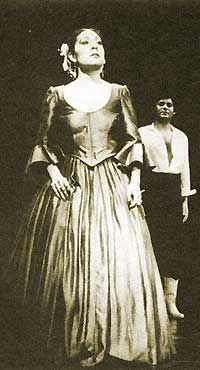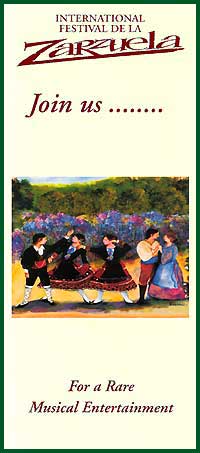Pablo Zinger![]()
Pablo Zinger, the multi-talented conductor and musical director, pianist/accompanist, lecturer and writer, has justly been called the USA's "King of Zarzuela" (in Opera News, July 1997).
|
Born in Uruguay, Zinger came to New York in 1976. Since then he has worked widely in theatre, opera and the concert hall throughout the Americas and in Europe. His many recordings include the 2001 Grammy award-nominated crossover album The Clarinetist with Paquito D'Rivera, as well as two ground-breaking CDs of music by Carlos Suriñach, Tango Apasionado with Astor Piazzolla and the Video/DVD of Luisa Fernanda at the Jarvis Conservatoire. |
|
He responds to questions from Christopher Webber . . .![]()
How did your early years in Uruguay shape your musical
interests?
The works of Albéniz, Granados, De Falla and other
Spanish composers were an important part of the pianistic repertoire I used to
study in Uruguay. In addition, I was always very interested in the music of
Latin American composers, like Ginastera, Villa Lobos, etc. My first
musical direction job was the tango opera Marta Gruni by Jaurés
Lamarque Pons, a Uruguayan composer, which marked the start of my whole
conducting career. The repertoire we played included a lot of French, Russian,
and a larger variety of "ethnic" European and other composers (Chopin, Grieg,
Dvorak, Prokofiev, Khachaturian, Gershwin). In contrast, when I arrived in the
U.S.A the emphasis was much more exclusive on the German-Austrian composers. I
believe that the American musical culture carries the weight of a very
Germano-centric past.
When and how did you first encounter zarzuela?
I never
heard a zarzuela in my native Uruguay. My first contact with the genre came in
1981, when upon my return from a major Latin American tour with the Spanish
Repertory Theatre of NYC, Artistic Director René Buch asked me to look
into it. I promptly proceeded to Lincoln Center's Public Library, where I heard
El Barberillo de Lavapiés (loved it) and Marina (hated it)
among others. From then on, we produced Doña Francisquita,
Luisa Fernanda, La corte de Faraón, La Generala,
La viuda alegre (Merry Widow), La vida breve, and anthologies of
Cuban and Puerto Rican music which included zarzuela selections, plus an
Anthology of Zarzuela.
What most appeals to you about the genre? What are your
favourite works and why? Which would you most like to conduct at the
moment?
I love exploring "virgin" territory. I never liked doing what
everybody else is doing. I enjoy performing material that has little or no
"performance tradition", because I can look at it as if it had been written
yesterday. When an American audience sees a zarzuela, a large majority has not
seen it ever before. That's an exciting feeling.
My favorite works are
Luisa Fernanda, La verbena de la Paloma, La tabernera del
puerto, and on the lighter side, Las Leandras and El dúo
de La Africana. I would love to conduct all of these and many others.
How do you feel zarzuela is comparable with other national
schools of ‘sub-operatic' theatre?
I know this was not your
intention, but I dispute the term ‘sub-operatic', since it could be
construed as something "under" or inferior to opera. I believe that musical
theatre is different but not necessarily inferior to opera in any way. I think
this applies to American Musical Theatre, Gilbert and Sullivan, Opéra
Comique, etc. After all, Carmen was written with dialogue … The
role and scope of zarzuela in Spanish culture is greater than in most other
cultures (except American musical theatre).
Do you approach zarzuela in a different way from opera? What if
any are its special demands on performers, conductors and stage
directors?
Both with opera and with zarzuela or musical theatre I
emphasize the importance of the word. First of all I am a stickler for diction.
Much too often words are not understood by the audience. Singers need to
understand that speaking or singing clearly is not enough. There has to be an
enhanced, exaggerated diction, in order to compensate for the diffusing effects
of hall acoustics and the singing range. Once the singer/actor understands the
words and makes them understood, there is the issue of making artistic
decisions on what meaning we give to the words, i.e. interpretation. I
encourage singers to spend less time singing and more time thinking (about
words, music and interpretation).
|
|
One particular challenge of zarzuela and musical theatre is the need to not only sing but to speak convincingly. I believe (and so does Mr. Domingo) that zarzuela is an excellent training for singers in terms of acting. Your work in New York has covered a variety of approaches
to the genre, some based primarily on modern, theatrical stage values, others
on more traditional musical ones. Which seemed to you most
fruitful? |
Since the death of Pablo Sorozábal in 1988, the romantic
zarzuela has been almost exclusively a "museum" art. What are its prospects for
creative renaissance as a living stage form?
I believe the chances of
survival of zarzuela depend on the operatic "establishment" embracing the genre
or not. It's an uphill battle, and time will say.
In your revealing 1996 article for the New York Times, you
wrote about "low standards of performance and recording" leading to
zarzuela carrying "an unjust stigma". With what in this negative
professional, critical or public attitude to zarzuela would you take
issue?
Tradition can be a heavy burden. Sometimes bad singing and hammy
acting pass as a zarzuela standard, and that does not serve well an art form
which has great musical value. The quality of zarzuela libretti tends to be
inferior to the music, but there are indeed some good ones out there. I often
feel that it is good for non "zarzueleros" to approach the genre, so
that they don't bring that old baggage with them. One example of this is the
concept of the "tenor cómico". While I respect and appreciate the
contributions of non-operatic singer/actors, who can bring a fresh approach to
comic roles, this does not mean that we should have bad singing as a standard!
The role of Cardona in Doña Francisquita, for example, requires
somebody who can sing very well (and high) and act splendidly.
Connected with this, do you feel the legendary series of
Alhambra recordings under Ataulfo Argenta and others did the genre a
disservice? Which post-War performers and/or conductors of zarzuela do you
admire?
The recordings by maestro Argenta were among the better ones in
the genre, and some of the more recent Auvidis/Valois series as well as the
late Kraus Doña Francisquita were excellent. Among my favorite
zarzuela performers are Mr. Domingo and Teresa Berganza. It is unfortunate that
Victoria De los Ángeles (my idol ...) never recorded a whole zarzuela,
but her disk of zarzuela arias is a constant source of inspiration. Moreno
Torroba and Sorozábal were both accomplished conductors, but they did
not always get the orchestras they deserved.
Many critics in the past have stated categorically that
zarzuela does not ‘travel' outside the Hispanic world. Do you
agree?
I don't think that a zarzuela like Luisa Fernanda is
inferior at all to any opera, and the libretto (with judicious cuts) deals with
universal issues (loyalty in love and politics). In fact, I know few operas
which have such an uninterrupted succesion of "hit tunes"! I believe there is a
perception in the U.S. operatic world that Spanish music is "exotic" and
outside the mainstream. This is due in part to the fact that Hispanics in the
U.S. are viewed as working class immigrants and culturally inferior. Many opera
companies consider zarzuela only as a device to "attract new audiences". In
other words: if we present "your" music (zarzuela) perhaps you'll come and see
"ours" (opera) and we'll hook you into our suscriber base. I think this is a
patronizing attitude, which views zarzuela as a marketing ploy, instead of a
genre with intrinsic values, which anybody can appreciate, if they keep an open
mind, and if its presented with respect and quality. Cultural prejudices die
hard.
|
What are your feelings about ‘zarzuela in
translation', at least in the USA? Do you find a difference between the Spanish and
Hispano-American attitudes to the zarzuela heritage? |
|
How - if at all - and in what ways has the place of zarzuela
changed in the USA, since you began work in New York? Has funding for Hispanic
culture become easier?
Zarzuela has stagnated or retreated in the last
few years. Most significant efforts were led by Mr. Domingo (Doña
Francisquita in Washington, El gato montés in Los Angeles).
Most other efforts have been carried out by smaller opera companies or
independent producers, but zarzuela remains a rarity. Interest in Hispanic
culture remains high in all the arts (visual, literary, cinema, instrumental
music, etc.) but opera lags behind. After September 11, economic difficulties,
conservative opposition to public funding of the arts and the latest war,
funding for the arts is difficult to get for anybody. My own series in Town
Hall, where I had presented Lecuona's María la O, Roig's
Cecilia Valdés, Barbieri's El Barberillo de
Lavapiés and Piazzolla's María de Buenos Aires and
Pueblo Joven has been put on hold because of funding cuts at the city,
state and private levels. Do you know any zarzuela loving millonaires out
there?
If I did, they'd be funding zarzuela here in London! Do you
feel, as some do in Spain, that zarzuela audiences in the USA are getting older
and smaller?
The jury is still out. Since the U.S. is a more "virgin"
territory, I see ample potentialities for audience development among the
younger generations.
How interested and informed are performers in the USA about
romantic Spanish music from Barbieri onwards? Do singers take easily to the
stylistic and linguistic demands of zarzuela?
I get numerous requests
for coaching in NYC every week. Operatic singers are fascinated by the musical
riches of zarzuela. The recently published anthologies of arias are quite
popular here. I have offered workshops in NYC about Singing in Spanish in
general, and I have recently self-published a Diction Guide which includes two
CD's of spoken examples, geared directly to singers' needs. These discuss all
of the rules of pronunciation, and the various accents (Spain, Latin America,
Caribbean, Ríoplatense).
You have worked with - and interviewed - Plácido
Domingo, who has been fighting a crusade on behalf of zarzuela for many years.
How have professional contacts with him affected you?
Mr. Domingo is a
universally admired figured. We just need more Domingos to go around ... When I
was Assistant Conductor for the Washington production of Doña
Francisquita, Mr. Domingo was personally involved with every aspect of the
production. I remember him discussing the verisimilitude of the prop oranges
that were supposed to roll on the floor! That was inspiring.
What are your current plans and future ambitions in
zarzuela?
What are your current plans and future ambitions in zarzuela?
I have had some interesting activities working alongside maestro James Demster
with the Compañía Mexicana de Zarzuela Domingo Embil
(promoted by Ms. Pepita Serrano), and I have been contacted by Orlando Opera
about a possible Luisa Fernanda in May 2004. I hope that zarzuela will
win its deserved place among other operatic/musical theatre genres. I would
love to be involved in that process in whatever way I can. I am thinking of
developing a "Pocket Zarzuela Company" of soloists, that could travel easily
and present zarzuelas in semi-staged form, and promote interest in the
genre.
© Pablo Zinger 2003
Pablo Zinger lives in New York City
and can be
reached at: pablozinge@aol.com![]() Pablo Zinger
website
Pablo Zinger
website![]() zarzuela
homepage
zarzuela
homepage


